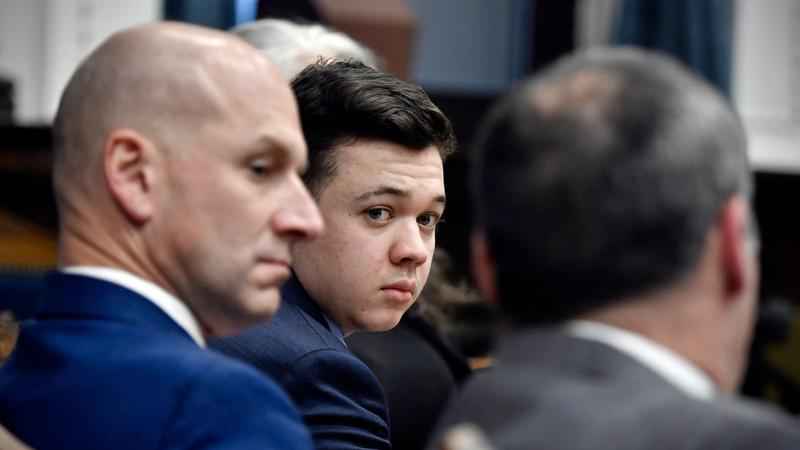Kyle Rittenhouse jury returns for 4th day of deliberations

Kyle Rittenhouse, center, looks over to his attorneys as the jury is dismissed for the day during his trial at the Kenosha County Courthouse in Kenosha, Wis., on Thursday, Nov. 18, 2021.[Sean Krajacic/The Kenosha News via AP, Pool]
The jury at Kyle Rittenhouse’s murder trial began deliberating for a fourth day Friday, as prosecutors argued against a defense request for a mistrial, saying there was “no factual or legal basis” for the judge to grant it.
Rittenhouse, 18, is on trial for killing two men and wounding a third with a rifle during a turbulent night of protests that erupted in Kenosha in the summer of 2020 after a Black man, Jacob Blake, was shot by a white police officer. Rittenhouse said he acted in self-defense, while the prosecution argued he instigated the bloodshed.
Even as the jury weighed the evidence, two mistrial requests from the defense hung over the case, with the potential to upend the verdict if the panel were to convict Rittenhouse. One of those requests asks the judge to go even further and bar prosecutors from retrying him.
In their mistrial bid, Rittenhouse’s lawyers complained that they were given an inferior copy of a potentially crucial video and that a prosecutor asked Rittenhouse improper questions during cross-examination about material not admitted into evidence and about his exercising of his constitutional right to remain silent.
In a reply filed with the court, prosecutor James Kraus said that the state did not intentionally provide the defense with a lesser-quality video and that Rittenhouse’s lawyers also were supplied with a copy of the original, higher-quality footage played in court.
Kraus also said in his reply that the file was compressed by the Kenosha Police Department’s email program. He had earlier argued in court that the compression was the fault of the defense attorneys’ email program.
Prosecutors contend the video shows Rittenhouse pointing his gun at protesters just before the shooting erupted.
The defense has also accused prosecutors of deliberately trying to provoke a mistrial because their case was going poorly and they wanted a do-over trial. But Kraus denied that, saying the state “has never had any intention to create a mistrial” so that it could retry Rittenhouse.
If the judge grants the mistrial request based on the video, Rittenhouse could be retried. If he grants an earlier defense bid for mistrial, based on the prosecutor’s questions, he could not be retried.
The jury resumed deliberations the morning after the judge raised eyebrows among lawyers when he let a juror take home a copy of the detailed legal instructions he gave to the panel.
As the third day of deliberations ended Thursday, a juror asked Circuit Judge Bruce Schroeder if she could take the jury instructions home, and he said yes. Before deliberations, Schroeder read the jury some 36 pages of explanation of the charges and the laws of self-defense.
“I don’t know about you guys, but I watch a little TV, in the morning, in the evening. And some of the greatest legal minds in the country, I’m delighted to say, agree with us that the instructions are very confusing,” the judge said in granting the juror’s request.
After the jury departed, Rittenhouse attorney Mark Richards told the judge he feared that such a move would lead to jurors looking things up in the dictionary or doing their own research at home.
Tom Grieve, a Milwaukee lawyer and former prosecutor not involved in the case, called the move “definitely unusual in my experience.”
“The natural issue is that it will precipitate armchair research and table discussion,” he said.
Rittenhouse was a 17-year-old former police youth cadet when he went to Kenosha in what he said was an effort to protect property after rioters set fires and ransacked businesses on previous nights.
He shot and killed Joseph Rosenbaum, 36, and Anthony Huber, 26, and wounded Gaige Grosskreutz, now 28. Rittenhouse is white, as were those he shot.
The case has exposed deep divides among Americans over guns, racial injustice, vigilantism and self-defense in the U.S.
Rittenhouse could get life in prison if convicted of the most serious charge against him.